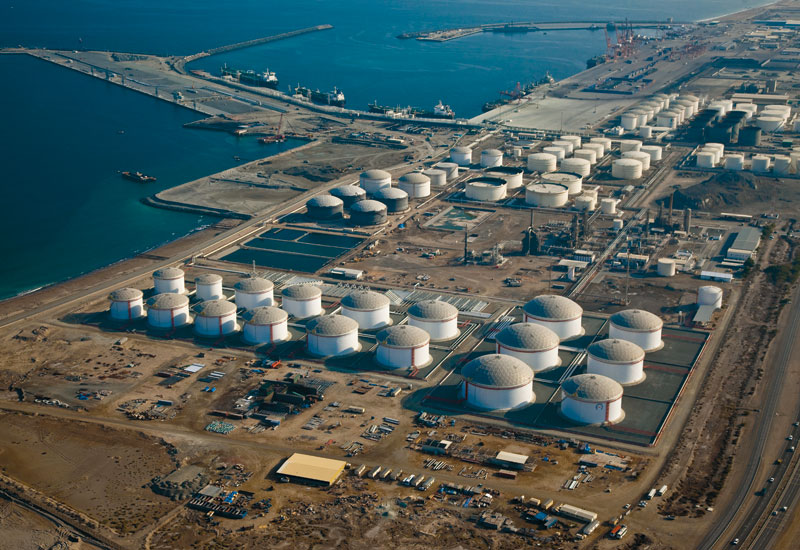Vitol’s UAE storage and refining facility has helped propel Fujairah to the big leagues in the global energy trading game
Oil trading on a global scale is a complex task when you are dealing with 5 million barrels of crude oil products every day. Swiss based oil trading company, Vitol, which has been specialising in the transacting, storing and transporting of oil for the best part of 50 years operates various fuel storage terminals around the world as part of its larger remit of providing energy and energy solutions to customers that are as diverse as electricity companies and airlines.
On the back of a recent announcement for a major oil import and distribution terminal in Cyprus worth US$129 million, Oil & Gas Middle East joined Vitol’s Dubai based managing director Christopher Bake on a site visit to its strategically important Fujairah fuel storage and refining facility to discuss the site’s growth plans and the importance of crude oil pricing to the oil and gas industry.
Vitol which owns 90% of the Fujairah Refining Company Ltd (FRCL) site – through its storage terminal arm Vitol Tank Terminals International (VTTI) – with the balance 10% owned by the government of Fujairah, first bought the facility in 2007 after it was mothballed in 2003 and operated as an oil terminal in the interim period.
With the port of Fujairah literally next door and around 200 ships anchored offshore at any given time, Vitol’s FRCL facility is ideally positioned to handle crude oil and products coming in and leaving the region. Bake says that from the outset the
concept was to take over the facility, overhaul and expand it from its initial 460 000 cubic metre storage capacity to 1.2 million cubic metres over the past two years with further land to expand upon.
“Fujairah is probably the largest independent terminal catering to one user in the region,” claims Bake. “Fujairah, logistically over the last 10-15 years has changed dramatically, it’s the third largest bunkering port in the world and with the existing terminals and the advent of some other independents it is going to become a world scale crude oil and oil product storage hub,” he explains.
He says that the Fujairah facility will cater to regional supply allowing the company to run the refinery and add value to products that it can buy and sell in the region and believes that the growth of Fujairah as a major logistics and trading hub will spur growth in other related areas.
“You have Fujairah that grows as a natural port for a staging post to vessels calling into the Gulf, on the back of that a marine industry grows, on the back of that a large bunkering business grows. The bunkering business today in Fujairah makes it the third largest bunkering port in the world.”
As the refinery is currently being expanded, the company has further plans to increase crude storage.
“Right now we’re running some crude blends, condensates and heavy crudes and we’re just looking to give ourselves a little bit more flexibility by putting some incremental refining capacity on line in the next 12 months,” says Bake.
Pricing & Benchmarks
Bake, who joined Vitol as a gasoline trader in Houston, Texas in 1994, is adamant that the market pricing mechanisms of crude is often overlooked particularly in the upstream segment of the industry.
He says that the creation of the Dubai Mercantile Exchange (DME) in which Vitol has a small regional equity stake, is significant and has allowed a transparent market driven pricing mechanism that can act as a benchmark for crude prices. He admits that it has yet to be accepted by influential players such as Aramco and the Abu Dhabi based heavyweights.
“It’s ‘chicken and egg’, they understand their pricing references right now, their customers understand their pricing references and they’re afraid that if they switch over to this new reference they may lose out,” Bake says.
However because the DME tracks the more established West Texas Intermediate (WTI) or Brent indices, Bake explains that there is little to be afraid of as the relative value of crude is dependent on the values of alternative benchmark prices.
Risks
The managing director said that as Fujairah becomes a more prominent port with incremental storage there will be more interest to store regional products and crudes and manage risk on a regional basis out of the emirate.
“This is generally a very stable region with fairly predictable supply models but historically in the last 10-15 years with the recent conflicts in Iraq and with some of the tensions with Iran, there is always a risk. One such risk is of a potential bottleneck in the Strait of Hormuz and the potential curtailment to oil flow,” Bake says.
On a day to day basis, the risks that Vitol must manage are the physical prices of the oil and products it trades.
“Between 13-15 million barrels of oil flows out of this region [daily] so the impact geopolitically is fairly immense,”
he says.
“Most of the oil sold in this region is sold to an end user and that barrel is not freely tradable,” he says, explaining that regional oil producers tend to have airtight transaction agreements with end-users, specifically refineries. The Oman Crude Oil Futures Contract (DME Oman) is the only freely-traded free destination crude barrel that trades in the Middle East.“Omani barrels as with other areas such as West African or Caspian producers can be freely traded i.e. they can be bought and sold to multiple intermediaries which creates liquidity and transparency and which in the end sets the price of oil.
“The free purchase and sale of oil establishes price and it’s the incremental barrel (or not) thereof, that determines at what price the barrel transacts at,” Bake says.





